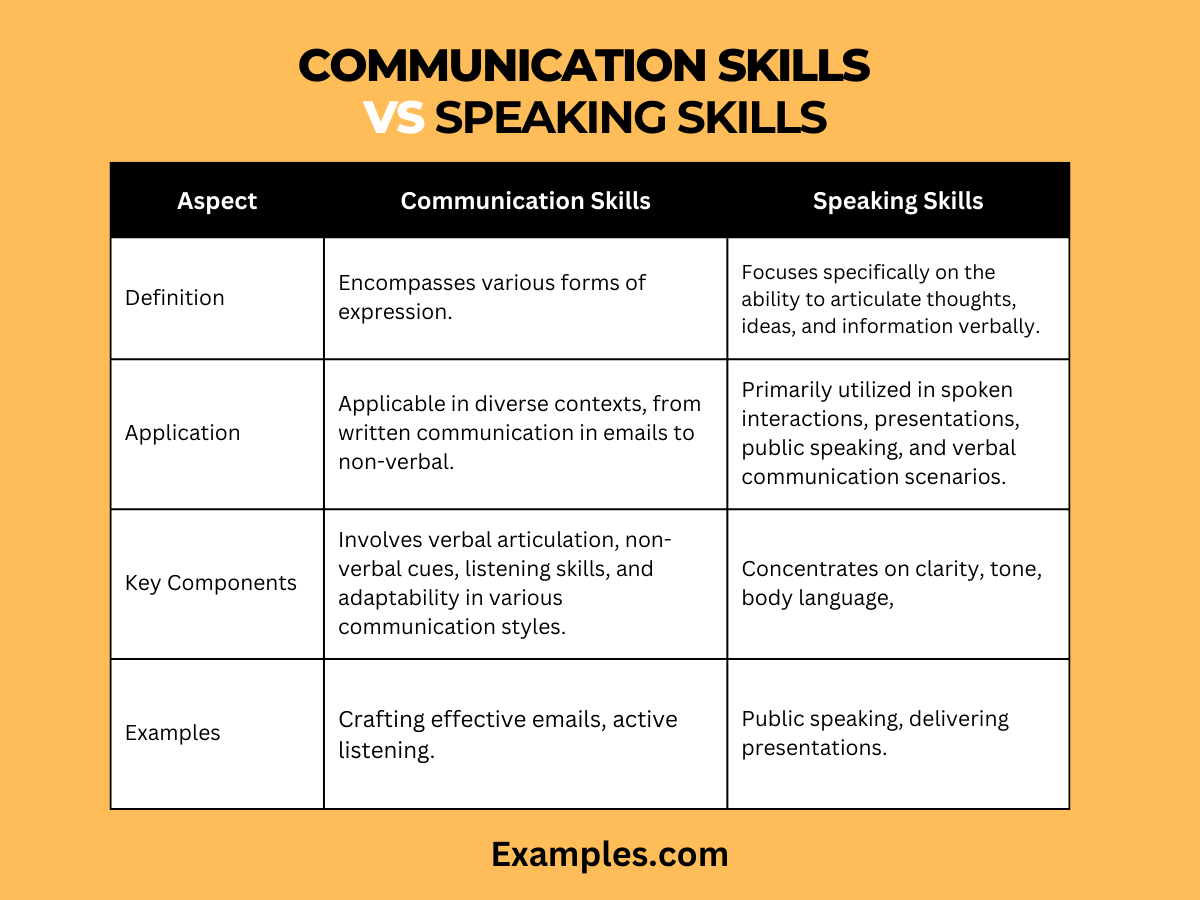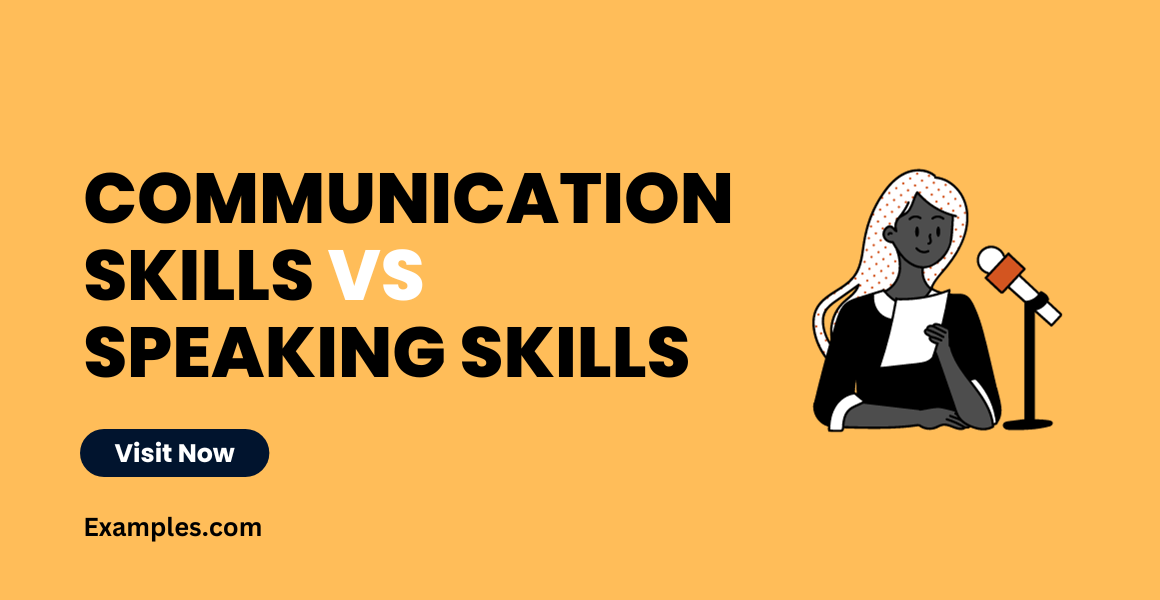Communication Skills vs Speaking Skills – 19+ Examples
Unlock the secrets of compelling expression in our comprehensive guide on Communication Skills vs Speaking Skills. Delve into nuanced strategies, practical examples, and expert tips to refine your abilities. Navigate the subtleties of communication, bridging the gap between theoretical skills and real-world application. Enhance your prowess with immersive insights and elevate your proficiency in both spoken and nonverbal interactions. Uncover the power of articulate expression with a spotlight on dynamic Communication Examples to guide your journey to effective communication mastery.
Difference between Communication Skills and Speaking Skills
Embark on a journey to distinguish and hone your communication prowess with our detailed guide. Explore the subtleties of both Communication Skills and Speaking Skills, comparing and contrasting their nuances. The table below offers a structured overview, aiding your understanding of these crucial skills for effective expression.

| Aspect | Communication Skills | Speaking Skills |
|---|---|---|
| Definition | Encompasses a broad spectrum, including verbal, non-verbal, and written communication methods. | Concentrates specifically on the ability to articulate thoughts, ideas, and information verbally. |
| Application | Applicable across diverse contexts, from crafting written communication in emails to expressing non-verbal cues in face-to-face interactions. | Primarily utilized in spoken scenarios, such as presentations, public speaking, and verbal communication interactions. |
| Key Components | Involves verbal articulation, non-verbal cues, active listening, and adaptability to various communication styles. | Focuses on clarity, tone, body language, and the ability to engage and connect with an audience verbally. |
| Examples | Encompasses crafting effective emails, practicing active listening, and navigating diverse communication styles in various settings. | Includes scenarios such as public speaking engagements, delivering presentations, participating in meetings, and engaging in verbal discourse. |
| Importance in Business | Vital for both written and oral communication within a professional setting, fostering collaboration and mutual understanding. | Crucial for driving business success through effective presentations, negotiations, and interpersonal interactions that leverage strong verbal communication skills. |
| Skill Development Strategies | Strategies include developing active listening skills, refining written communication techniques, and practicing adaptability across diverse communication scenarios. | Focus on enhancing public speaking abilities, refining articulation skills, and honing the art of engaging an audience effectively in various verbal communication settings. |
| Interpersonal Interaction | Encompasses building positive relationships, resolving conflicts, and collaborating seamlessly with diverse teams. | Focuses on connecting with individuals through spoken interactions, fostering engagement, and navigating social dynamics effectively. |
| Technological Integration | Incorporates digital communication tools, email etiquette, and proficiency in virtual communication platforms. | Adapts to speaking in virtual environments, leveraging technology for effective presentations, webinars, and online interactions. |
| Educational Settings | Crucial for effective classroom communication, student engagement, and conveying complex concepts clearly. | Important for educators to articulate information coherently, maintain student engagement, and deliver impactful lectures and presentations. |
| Cross-Cultural Communication | Navigates diverse cultural nuances in communication, adapting styles for effective global interactions. | Emphasizes cultural sensitivity in spoken interactions, recognizing diverse cultural backgrounds and tailoring communication to resonate effectively. |
20 Examples of Communication and Speaking Skills
Elevate your expressive prowess with our curated list of 20 exemplary Communication Skills vs Speaking Skills examples. This guide transcends theoretical concepts, providing practical insights into mastering verbal and non-verbal communication. From public speaking finesse to written communication mastery, each example is a testament to effective expression in diverse scenarios.
10 Communication Skills Examples
- Active Listening: Practice active listening by fully focusing on the speaker, providing feedback, and asking clarifying questions to enhance understanding.
- Non-Verbal Cues: Master the art of non-verbal communication, utilizing gestures, facial expressions, and body language to complement your spoken words.
- Empathy: Demonstrate empathy by understanding and acknowledging the emotions of others, creating a supportive and inclusive communication environment.
- Clear Articulation: Ensure clarity in your communication by articulating thoughts concisely, avoiding jargon, and adapting your language to the audience.
- Adaptability: Navigate diverse communication styles by adapting your approach to different audiences, ensuring your message resonates effectively.
- Conflict Resolution: Resolve conflicts diplomatically by addressing issues directly, seeking common ground, and finding mutually acceptable solutions.
- Effective Feedback: Provide constructive feedback by focusing on specific behaviours, being specific, and offering suggestions for improvement.
- Cultural Sensitivity: Practice cultural sensitivity by adapting your communication style to respect and accommodate diverse cultural backgrounds.
- Inclusive Language: Promote inclusivity with inclusive language, avoiding discriminatory terms and phrases that may alienate certain individuals or groups.
- Time Management Communication: Communicate effectively about timelines, deadlines, and expectations, ensuring everyone is on the same page for project success.
10 Speaking Skills Examples
- Tone Modulation: Mastering tone modulation is pivotal; adopt a confident tone for presentations and a empathetic one for discussions.
- Active Listening: Effective speaking begins with listening; nod and maintain eye contact to show you’re actively engaged in the conversation.
- Clear Articulation: Ensure clear articulation by enunciating words distinctly, enhancing overall understanding in any spoken scenario.
- Body Language Awareness: Maintain open body language to convey confidence; avoid crossed arms and fidgeting for a positive impact.
- Storytelling Skills: Engage your audience by weaving relatable stories into your speech, making your message memorable and impactful.
- Pausing for Emphasis: Strategically use pauses to emphasize key points, allowing your audience to digest and absorb critical information.
- Empathy in Speech: Inject empathy into your speech; use phrases like “I understand” to convey understanding and connection with your audience.
- Concise Communication: Practice concise communication; eliminate unnecessary details to keep your message focused and easily digestible.
- Adaptability: Adapt your speaking style to suit the audience; tailor your language and tone based on the context and individuals involved.
- Humour Integration: Inject humour for a light-hearted touch; a well-timed joke can break the ice and make your speech more engaging.
Comparison Between Communication Skills and Speaking Skills
| Aspect | Communication Skills | Speaking Skills |
|---|---|---|
| Versatility | Versatile, covering verbal, non-verbal, and written forms of expression. | Primarily focused on the ability to articulate thoughts verbally. |
| Application | Extensively applied in various contexts, including written communication and face-to-face interactions. | Mainly applied in spoken scenarios such as presentations, speeches, and discussions. |
| Components | Encompasses verbal articulation, non-verbal cues, active listening, and adaptability to diverse communication styles. | Focuses on the clarity of speech, tone modulation, body language, and audience engagement. |
| Examples | Crafting emails, navigating diverse communication styles, and actively listening in a meeting. | Engaging in public speaking, delivering impactful presentations, and participating in verbal discourse. |
| Business Importance | Vital for written and oral communication within a professional setting, fostering collaboration and mutual understanding. | Crucial for successful presentations, negotiations, and interpersonal interactions in the business environment. |
| Skill Development Strategies | Develop active listening, refine written communication, and adapt communication style based on the audience. | Enhance public speaking abilities, refine articulation, and engage effectively with diverse audiences. |
Communication Skills vs Speaking Skills in Business
In the dynamic landscape of business, navigating the nuances between Communication Skills and Speaking Skills is paramount. While communication skills encompass diverse forms, speaking skills focus specifically on verbal articulation. This guide unveils their distinctive roles in the business realm, providing insights into effective strategies that foster collaboration, negotiations, and impactful presentations.
- Pitching Ideas: Master the art of pitching ideas succinctly, ensuring your message is compelling and resonates with stakeholders.
- Negotiation Techniques: Refine negotiation techniques; employ clear and persuasive verbal skills to reach mutually beneficial agreements.
- Meeting Facilitation: Effectively facilitate meetings by articulating goals, guiding discussions, and ensuring active participation.
- Client Presentations: Ace client presentations with confident verbal communication, showcasing expertise and addressing client needs adeptly.
- Crisis Communication: Navigate crises with effective verbal communication, providing clear instructions and maintaining transparency within the team.
- Leadership Communication: Exhibit strong leadership communication; articulate visions, goals, and expectations to inspire and guide your team.
- Cross-Functional Collaboration: Enhance cross-functional collaboration by communicating seamlessly with diverse teams, fostering synergy and collective achievement.
- Business Storytelling: Craft compelling business stories; use articulate narration to make data and information more relatable and impactful.
- Executive Presence: Develop executive presence through refined verbal skills, conveying authority, and credibility in high-stakes business scenarios.
- Virtual Communication: Adapt speaking skills for virtual environments; maintain engagement and clarity in virtual meetings, presentations, and discussions.
Is Communication Skills the Same as Public Speaking?
In the realm of effective expression, distinguishing between Communication Skills and Public Speaking is pivotal. This comprehensive guide seeks to debunk common misconceptions, shedding light on the nuanced differences between these two essential facets of expressive competence. Explore the depths of each skill set, understanding how they converge and diverge in various scenarios, from interpersonal communication to public speaking engagements. Let’s unravel the intricacies and clarify the distinctions between Communication Skills and Public Speaking.
Understanding the Foundations
Communication Skills: Encompassing verbal, non-verbal, and written forms of expression, Communication Skills are the bedrock of effective interaction. From crafting emails to engaging in face-to-face discussions, these skills form the backbone of seamless communication across diverse contexts.
Public Speaking: While an integral part of Communication Skills, Public Speaking narrows its focus to the spoken word. It involves addressing an audience, delivering presentations, and mastering the art of articulate expression in a public forum.
- Scope of Application:
- Communication Skills: Versatile, applied in various settings including written communication and face-to-face interactions.
- Public Speaking: Primarily used in spoken scenarios, such as presentations, speeches, and discussions in public settings.
- Components:
- Communication Skills: Encompass verbal articulation, non-verbal cues, active listening, and adaptability to diverse communication styles.
- Public Speaking: Focus on the clarity of speech, tone modulation, body language, and engaging an audience during a presentation.
- Examples:
- Communication Skills: Crafting emails, navigating diverse communication styles, and actively listening in a meeting.
- Public Speaking: Engaging in public speaking, delivering impactful presentations, and participating in verbal discourse.
Dispelling the Myth
No, they are not the same. Communication Skills are the broader set, encompassing various forms of expression, while Public Speaking is a specialized subset focused on verbal articulation in a public context. Effective communicators possess both, adapting their skills to diverse scenarios.
Navigating Professional Realms
Understanding these distinctions is crucial for personal and professional growth. In the business world, strong Communication Skills are essential for collaboration, negotiations, and written communication, while Public Speaking becomes pivotal in scenarios like presentations, pitches, and client interactions.
Mastering Both for Holistic Expression
In conclusion, while Communication Skills and Public Speaking share common ground, they are distinct in scope and application. Embrace the unique strengths of each, honing a holistic expressive competence that serves you across diverse personal, professional, and public scenarios.
In the intricate tapestry of effective expression, mastering both Communication Skills and Speaking Skills is paramount. This comprehensive guide illuminated their distinctions, from versatile communication methods to the nuanced art of public speaking. Embrace the diverse examples provided for each, and navigate personal, professional, and public scenarios with enhanced confidence and competence. This guide serves as your compass for achieving holistic and impactful communication.



